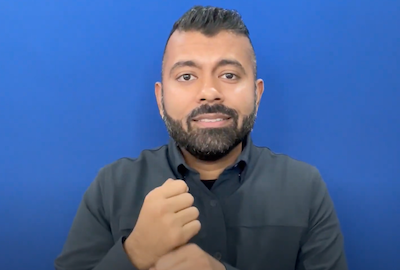Accessibility at Creating Change

The National LGBTQ Task Force is always committed to improving accessibility at Creating Change. The conference currently offers American Sign Language, Protactile ASL, and Spanish interpretation, mobility devices, large-print programs, and meal assistance.
Accessibility at Creating Change is for everyone. Each of us contributes to making the conference a more accessible space for all. As such, the Task Force asks all participants to be mindful of:
- Physical contact: Asking for consent before offering handshakes, hugs, and/or other greetings that include physical contact.
- Elevator usage: Please consider using escalators or stairs if you can. This helps ensure elevators can be used by participants who most need them.
- Scent: Avoiding use of cologne, perfume, and/or other heavy scents and fragrances.
Creating Accessibility
The National LGBTQ Task Force and the Creating Change organizers and host venue strive to make Creating Change welcoming and accessible for attendees with disabilities. In the spirit of learning how our communities can be inclusive of and accessible to all people, we offer these guidelines for creating a community where people with disabilities are valued and respected.
Understand that the lives of disabled people are neither inspirational nor pitiful because of our disabilities. Rather our disabilities are ordinary and familiar parts of who we are.
Ask and wait for an answer before you try to help someone. What you assume is helpful may not be.
When you encounter someone using a service/assistance or guide dog, do not pet, offer food to, or interact with the animal in any way. Do not comment on the dog’s presence i.e. “and who do we have here?” They are working hard; you are supporting the independence and autonomy they provide by not distracting them.
To be understood by as many people as possible, speak at a moderate volume and pace. Practice active listening by asking and responding to questions and giving both verbal and non-verbal cues that you are still engaged in the conversation.
When you are speaking to someone using an ASL (American Sign Language) interpreter, address the person you are speaking with, not the interpreter.
Many people here have disabilities that affect the ways that they learn, understand, and/or communicate. Practice patience with those who learn and/or communicate at a different pace or in a different way than you do. Don’t make assumptions based on atypical speech patterns, body language, or eye contact. If you are having difficulty communicating with someone, try a different form of communication, like writing or demonstration instead of talking.
Flashing lights can trigger seizures or other conditions. Avoid wearing or carrying decorative flashing lights and don’t take photographs using the flash on your camera in public spaces.
There are seats set aside for people with varying disabilities, both up front and scattered throughout in the plenary space and in the meeting rooms. Please be prepared to move chairs to make room for people using wheelchairs, wherever they may wish to sit at plenary sessions and workshops.
To make it easier for everyone to move around the conference freely, please don’t “clump” in the middle hallways. Be aware of the people around you when navigating tight, crowded public spaces, and leave room for people to pass safely; and please hold heavy or inaccessible doors open for others.
Becoming scent-free is an important step toward access for people with disabilities and/or chronic illnesses and is a skill you can practice everywhere. If you are not accustomed to going scent-free, think about the products you use in your day. You can either not use shampoo, soap, hair products, perfume, essential oils, skin lotion, shaving cream, makeup etc., or use fragrance-free alternatives. If you must use scented products, please sit or stand as far away as possible from areas designated “Scent Safer” areas. During plenary sessions, safer spaces are designated in the ballroom. If scents and chemicals present a barrier for you, please know that Creating Change is not yet a scent-free conference.
If you smoke, please do so only in the designated areas and away from entrances. When inside please sit or stand as far away as possible from those areas designated “Scent Safer” areas.
Challenge your assumptions. Some disabilities are less visible than others. Everyone has a right to use the accommodations they need without being criticized or questioned.
The Accessibility office is staffed most times during the Creating Change Conference. If you have questions, concerns or need assistance regarding access, please stop by the Accessibility Table adjacent to the conference registration area on the first floor:
- Electric scooters and wheelchairs.
- Viewing a large print grid schedule of events.
- Assisted Listening Devices for use during the conference.
- Magnifiers
- Readers
- Step stools
Conference attendees utilizing ASL interpreting services can meet interpreters at the Accessibility Table adjacent to the registration area on the first floor.
Listen to the needs and stories of disabled people when they are volunteered; yet please respect people’s privacy and boundaries by not asking unnecessarily intrusive questions. Many disabled people deal with daily curiosity about our bodies and find it exhausting. Educate yourself through books, web sites, and at the disability-related workshops at Creating Change. Then, please join the many hardworking allies who are working to respond appropriately to ableist situations.
